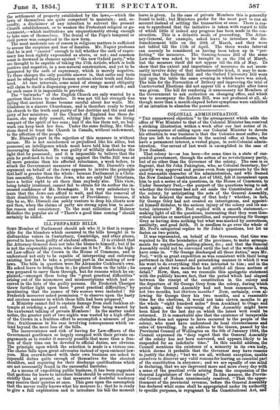ILL-PREPARED BILLS.
SOME Member of Parliament should ask who it is that is respon- sible for the blunders which occurred in the bills brought in to disfranchise voters in Canterbury, Cambridge, and other places, proved to have been guilty of electoral offences. It is evident that the Attorney-General does not take the blame to himself ; but if he is not the responsible person, who else can it be ? He is the high- est Law-officer of the Crown in the House of Commons, and is understood not only to be capable of interpreting and enforcing existing law but to take a principal part in the making of new laws. The bills in question were Sir Alexander Cockburn's own. He asked leave to bring them in ; he placed them on the table ; he was prepared to carry them through, but for reasons which he ex- plained,—amongst them being the "great practical difficulties" arising out of the misnomers and misdescriptions which had oc- curred in the lists of the guilty persons. Sir Frederick Thesiger threw further light upon these "great practical difficulties," by mentioning that the names of two women were included ! Sir Frederick moreover asked permission "to observe upon the hasty and careless manner in which these bills had been prepared."
A Ministry cannot fail to sustain damage from such luckless at- tempts at reaching a good end. Speak of time being wasted by the exuberant talking of private Members ! In the matter under notice, the greater part of two nights was wasted by a high officer of the Crown in a fruitless effort to accomplish a measure of jus- tice; fruitlessness in his case involving consequences which ex- tend beyond the mere loss of the bills.
The inconvenience and risk of having for Law-officers of the Government gentlemen so largely occupied with their private en- gagements as to render it scarcely possible that more than a frac- tion of their time can be devoted to official duties, are obvious. The principle upon which the selection is made is a vicious one. The choice falls upon great advocates instead of upon eminent law- yers. Men overwhelmed with their own business are asked to snperadd duties quite enough of themselves for the stoutest shoulders, and requiring for their discharge qualifications which are not necessarily found in the successful barrister. As a means of expediting public business, it has been suggested that motions for leave to introduce bills should be scrutinized more strictly than at present, so that measures of doubtful tendency may receive their quietus at once. This goes upon the assumption that the mover really knows what his measure is ; that he is ready to give a full explanation and to introduce his bill the moment , leave is given. In the case of private Members this is generally found to hold; but Ministers prefer for the most part to run an account instead of settling the transaction at once. There is rea- son to apprehend that the initiative is taken with regard to bills of which little if indeed any progress has been made in the con- struction. This is a delusive mode of proceeding. The Attor- ney-General, for example, asked leave to introduce the dis- franchisement bills on the 20th of March, and they were not tabled till the 11th of April. The three weeks interval can scarcely be considered as having been taken up in "per- fecting" the measures. The Gaming-houses Bill of the same Law-officer was asked to be brought in on the 23d of March, but the measure itself did not appear till the 5th of May. To show that the extent and importance of measures do not neces- sarily involve delay of that unbusinesslike kind, it may be men- tioned that the Reform Bill and the Oxford University Bill were laid upon the table the same evening in which leave was asked. The bills for the Prevention of Bribery and improving the trial of Controverted Elections did not appear till a fortnight after leave was given. The bill for rendering it unnecessary for Members of the Government to ask reelection on changing office, and which was to accompany the Reform Bill, was not produced at all, al- though more than a month elapsed before symptoms were exhibited of an intention to abandon the parent measure.


































 Previous page
Previous page